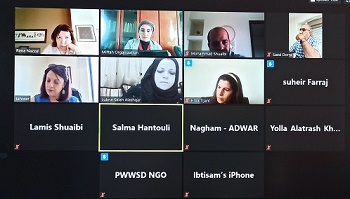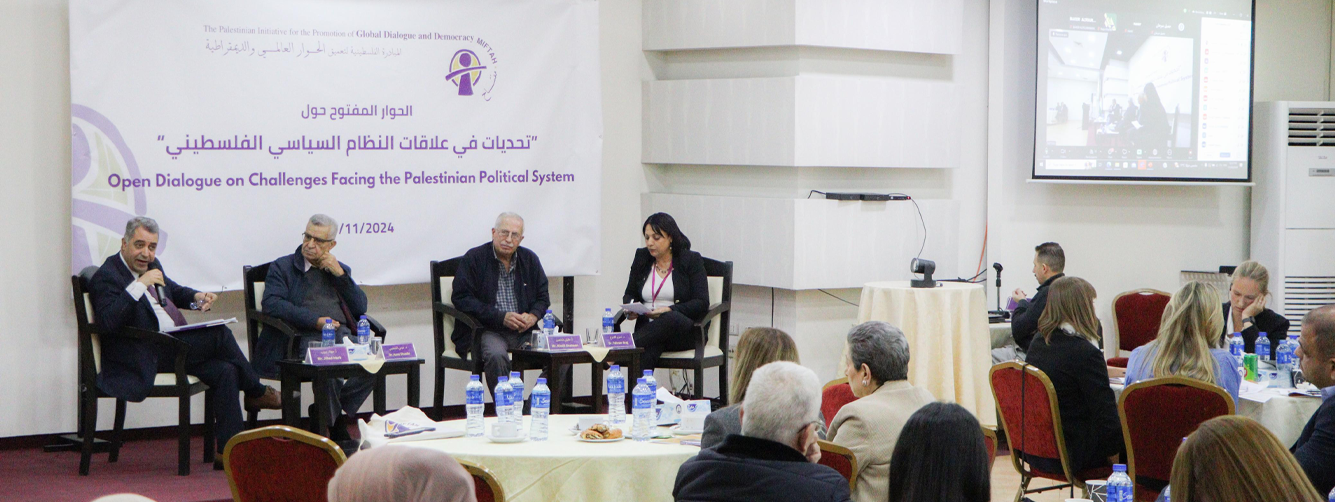
Ramallah – 11/8/2020 – MIFTAH recently held a zoom meeting showcasing the results of its report entitled “Political participation and economic repercussion on Palestinian women during the state of emergency”.
The report is part of MIFTAH’s “Policy dialogue and good governance” program which is aimed at promoting the participation of women and youth in formulating policies and supporting their representation at the decision-making levels. The report covered districts in the West Bank and Gaza Strip, with the objective of highlighting the gaps in the public discourse and enacted measures during the state of emergency. It also showcased the nature of the challenges and policies of exclusion against women’s participation during this period and displayed the nature of the programs directed towards supporting women during the state of emergency and home quarantine.
The session was opened by MIFTAH Deputy Executive Director Dr. Tahreer Araj, who stressed on the importance of employing a women’s perspective or ”gender lens” to expose the biases in public policies and which could be used as a tool for assessing their ability or inability to meet the needs of women and marginalized sectors in general. That is why, she maintained, it is important to begin periodic monitoring of the consequences of the coronavirus pandemic on women in order to offer an ongoing reading of the impact of interventions on women and the extent to which they take gender into consideration.
Araj said the report could help shed light on the interventions and public policies that do not take gender into consideration in order to rectify them through recommendations that would minimize the negative impacts of these policies and interventions. She also stressed on the importance of the report’s analysis of the political, economic and social status of women and the ramifications of the pandemic on women. She pointed out that MIFTAH was one of the first institutions to take an initiative in this regard through publishing this report, which focuses on the available data and information pertaining to women’s political participation and how the pandemic has reflected on the economic reality of Palestinian women in the West Bank and Gaza Strip. She maintained that the report addresses political participation from the perspective of its discourse and the enacted measures during the state of emergency and the programs targeting women whether from official or nonofficial parties.
This was followed by a presentation of the report’s results by head of the research team Lubna Al Ashqar. She discussed the preventative measures and procedures taken by the Palestinian government to contain the spread of COVID-19 after President Mahmoud Abbas declared a state of emergency in March, 2020.
The report pointed out that the lockdown contributed to the decline in economic conditions, affecting the situation of women who work in unsafe economic conditions in addition to families that lost their livelihood due to the pandemic and who were added to the list of “the new poor.”
Working women comprise 68% of the private sector (108,900 women), 31% of the public sector (50,400 women) and around 0.6% of those working in Israel and settlements (approximately 1,000 women). What’s more, women comprise 31.7% of the total number of workers in Palestine who work in the irregular sector32,200 females as opposed to 288,400 males. The irregular sector is comprised of wage employees who have no rights in the labor market (except for end of service compensation/pension), neither paid annual leave nor paid sick leave. These women are vulnerable to poverty and abject poverty, with estimations from the Ministry of Social Development indicating that at least 53.000 families in Palestine have fallen into a cycle of poverty in the first several weeks since the start of the pandemic because of loss of income. Moreover, 11% of Palestinian families are headed by women – 12% in the West Bank and 9% in the Gaza Strip, a criterion which was not taken into consideration when distributing aid among families.
Meanwhile, social conditions were exacerbated by the deteriorating economic situation, especially among women. Since the start of the pandemic, two women died because of domestic violence and 21% of women attempted suicide. Dozens of others were subjected to physical and psychological violence. 40% of women whose cases were reviewed had been subjected to psychological violence and 31% to physical violence although most of the women suffered from various forms of violence at the same time. Moreover, others suffered from different forms of violence such as restriction of freedom, sexual harassment, economic violence, rape, risks to their lives, cyber violence and forced marriage. According to the ministry, these conditions prompted 60% of women to flee from home and 21% to attempt suicide in addition to other negative impacts such as physical and mental illnesses, suffering broken bones, bruises and pregnancies out of wedlock.
There was also a noticeable rise in the rates of discrimination, exclusion and marginalization against women in the West Bank and Gaza Strip in addition to a spike in unemployment and poverty rates. This forced women to face socioeconomic challenges that pointed to the increased fragility of their situation and the growing discrimination between men and women. Ultimately, this contributed to the weakening and marginalization of women and to discouraging them them from participating in emergency committees, which reflected the declining situation of women at the level of political participation, starting from their limited participation in emergency and guidance meetings and excluding female local council members from combatting the pandemic alongside their male peers.
The number of women members in these committees did not exceed 120 women in the 400 committees formed. There were also the local women’s initiatives, which were halted or cancelled because of the lockdown in addition to discrepancies in terms of support for women, both cash or in-kind, during the state of emergency. This points to the deep gap between the official political, social and economic discourse which espouses equality and social political and economic justice for women (including the fact that Palestine is a signatory to international conventions such as CEDAW) and the actual implementation of this discourse on the ground.
In terms of how the economic situation reflected on the social condition of women, the report indicated that with women, girls, men and boys all remaining in the house, this should have generated a new functional dynamic for the household that would contribute to a change in the division of household roles, impacted by the changeup in economic social and political factors compared to the pre-lockdown situation, however, it has not changed.
The report also addressed women’s initiatives and institutions during the state of emergency which focused on awareness initiatives and programs that offer moral and monetary support, either through the efforts of community and local organizations in the West Bank and Gaza or through individual endeavors.
Recommendations
There were several interventions and commentaries regarding the report’s data, conclusions and recommendations, most significantly the demand for adopting new tools and mechanisms for action to avoid the gaps mentioned in the report and also to demand that the women’s movement take on a more effective role in confronting the repercussions of the crisis on women during the state of emergency and adopt a new feminist discourse. They also pointed to the need to conduct an in-depth study on the scope and impact of women at the various psychological, social and economic levels and to focus on issues pertaining to women’s political participation. Another recommendation was to shed light on the positive practices resulting from the state of emergency, citing the international community’s allocation of 50% of its support to women who head poor households, in addition to conducting an exploratory study from a women’s perspective which could be built on in the future. The participants called for a halt to the clear government biases against women and to hold discussions on the challenges women face along with creating alliances with progressive men who support women and their participation in public life. They also called for investing in positive initiatives for men during the pandemic and not excluding civil society from the measures and decisions taken by the government.
The report concluded with a number of recommendations at three levels: governmental, international and civil society.
Government: the report called for reviving the principle of separation of the three authorities and the implementation of measures pertaining to the pandemic to coincide with legal stipulations; to reconsider the division between the West Bank and Gaza; to organize general elections with the goal of reviving the PLC and the political system in general; to send a letter to the Prime Minister requesting reconsideration of the government discourse and executive decisions to guarantee that social justice and equality are achieved for both sexes; adopting a comprehensive democratic discourse that promotes freedoms and rights and guarantees pluralism and women’s political participation in responding to the pandemic; calling on citizens to call for protection of women and vulnerable social sectors in their discourse and to announce this in accordance with the law; to mete out the harshest possible punishment against those who attack women; to call for the formation of emergency committees and economic and social funds to be based on a clear and straightforward legal premise, which takes into consideration the standards of efficiency and diversity in expertise and individuals when forming any national committee to guarantee the integration of women’s competencies in these committees in various areas.
Another recommendation was for the government to expand the circle of consultations with the various parties when formulating the emergency plan or imposing a full lockdown to guarantee that the different needs of social sectors are met and to find effective solutions for poor families before announcing plans; to follow up on measures to implement the decisions with accuracy and transparency.
At the international level, the recommendations called on international institutions working on issues of democracy, human rights and gender to follow up on all human rights violations during the state of emergency with a focus on women’s rights and to send a message to the government urging it to implement policies that could combat cases of violence, poverty, impoverishment and exclusion exercised against women.
They also called for the continuation of support for civil society and government institutions in offering assistance and programs supporting women and families affected by the pandemic and formulating relief programs on the ground that help to pull women and families out of the cycle of poverty and violence.
Meanwhile, the recommendations called on civil society institutions to work through the government to organize the distribution of social aid in partnership with women’s organizations, federations and unions based on official and accurate statistics; that is, distribution should begin from the sectors most affected by the pandemic including women who head households and who lost their source of income, then progressing from the most to the least neediest without discrimination.
Finally, the participants called for pressure on the government to push for all government, private and civil sectors to assume all of their social responsibilities during the pandemic by involving it in specifying roles and responsibilities. An example of this is offering donations and directing programs for supporting marginalized sectors, including women, and coordinating efforts in support of cancelling taxes on women and individuals because of delays in bank loan payments and bounced checks, to guarantee the continuation of micro-projects and the economic protection of women.








